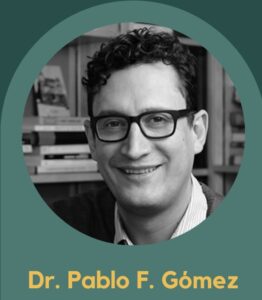7 April 20 23 — 12:00 noon — GAR 4.100
23 — 12:00 noon — GAR 4.100
Pablo F. Gómez (Univ. of Wisconsin)
“Body Arithmetic: Facts, Quantification, and the Human in the Seventeenth Century Black Atlantic”
This talk examines the history of the slave trade in the early modern Iberian Atlantic and Caribbean and its relationship to the emergence of novel practices related to the study and quantification of bodies and nature and the emergence of ideas about body facticity. The mathematics of early slave trading societies, Gómez argues, carried meaning that reified and institutionalized body quantification and population/group thinking in relation to labor, health, and disease. The everyday practice of accounting for enslaved African bodies shaped and solidified the logic and permanence of bodily quantification as the fundamental tool for measuring populations, their bodies, and their relationship to emerging notions of risk, political economy, public health, and epidemiology in the early-modern world. Focusing on the relationship between the violent world of slavery, emerging colonial capitalism, and African diasporic histories of knowledge-making brings to light the fundamental continuity that exists between the enslavement of millions of Africans and the history of modern quantifiable ideas about corporeality.
Pablo F. Gómez is Associate Professor in the Department of Medical History and Bioethics, and the Department of History at the University of Wisconsin, Madison. He is the author of The Experiential Caribbean: Creating Knowledge and Healing in the Early Modern Atlantic. His latest book, The Gray Zones of Medicine (an edited volume), explores the history of health practices in Latin America from the 16th to the 21st century through the biographies of unlicensed healers. Gómez is currently working on a history of facts, quantification, and bodies in the seventeenth century Atlantic World. He is also collaborating on several projects broadly related to global histories of science and Medicine and histories of enslavement, health, and corporeality in the Caribbean and Latin America.
This talk is co-sponsored by the Department of Religious Studies and LLILAS Benson Latin American Studies and Collections.